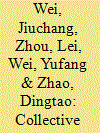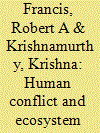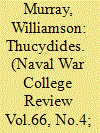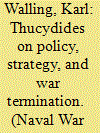|
|
|
Sort Order |
|
|
|
Items / Page
|
|
|
|
|
|
|
| Srl | Item |
| 1 |
ID:
131644


|
|
|
|
|
| Publication |
2014.
|
| Summary/Abstract |
Mass incidents are inevitable in contemporary China and the first thing we should learn is to adopt a correct attitude towards them. Based on the three elements-activity, interaction and sentiment-of collective behaviors in 52 mass incidents in China during 2007-2011, we find that collective behaviors in mass incidents show significant differences in activity, interaction and sentiment. A grade evaluation method is proposed to estimate the evolution of collective behaviors in 52 mass incidents and to classify such behaviors into five grades. Then the influence factors on the three elements are analyzed using multiple linear regression. The regression results demonstrate that the impacts of location, casualties, inner-group relations, group scale and duration on the three elements are very significant. Finally, in the light of the regression results, some implications of collective behavior in mass incidents are proposed for the relevant authorities in responding to mass incidents.
|
|
|
|
|
|
|
|
|
|
|
|
|
|
|
|
| 2 |
ID:
133286


|
|
|
|
|
| Publication |
2014.
|
| Summary/Abstract |
Environmental degradation resulting from warfare is a growing concern, particularly with increasing recognition of humanity's dependence on healthy ecosystems. Though environmental legislation does exist that seeks to prevent or mitigate environmental harm before, during and after conflict, it has limited scope and effectiveness. This may be one reason why the environmental laws of war are so rarely applied in attempts to bring parties responsible for environmental harm to justice. Enforcement of such legal instruments also requires appropriate quantification of environmental damage, which is particularly difficult in a warfare context. A focus on the loss of environmental resources, habitats or ecosystems is only part of the story-the real cost of environmental damage is in the loss of ecosystem services that such resources provide, both now and in the future, and which regional and global human societies depend upon. The ecosystem services framework, wherein the costs of damage to ecosystem services are quantified in economic terms, may prove a more effective way of highlighting the environmental damage resulting from warfare. Moreover, quantification along monetary lines is potentially more likely to establish a solid case for justifiable reparations than criteria relating to loss of biodiversity or ecosystem health, which are more difficult for society and governmental agencies to place specific values on. This article discusses the ecosystem services framework in the context of warfare, and highlights both the potential and the challenges that may accompany adoption of such a framework by the international community.
|
|
|
|
|
|
|
|
|
|
|
|
|
|
|
|
| 3 |
ID:
133374


|
|
|
|
|
| Publication |
2014.
|
| Summary/Abstract |
I have been teaching and reading Thucydides since the fall of 1975, and over that nearly forty-year period I have increasingly come to appreciate his enormous skills as a historian, as well as his sophisticated theoretical understanding of war. It is not that Thucydides set out to be a theorist in his account of the Peloponnesian War. Rather, the subtext of his depiction of the great war between Athens and Sparta presents a theory of conflict that in the power of its analysis helps to clarify not only the events of the war but also fundamental, theoretical truths about the nature and consequences of human conflict, truths as relevant today as they were late in the fifth century bc.1 This combination of history with a sophisticated
theoretical basis more than justifies Thucydides's claim at the beginning of his account: "And it may be that my history may seem less easy to read because of the absence in it of a romantic element. It will be enough for me, however, if my words are judged useful by those who want to understand clearly the events which happened in the past and which (human nature being what it is) will at some time or other and in much the same ways, be repeated in the
|
|
|
|
|
|
|
|
|
|
|
|
|
|
|
|
| 4 |
ID:
133375


|
|
|
|
|
| Publication |
2014.
|
| Summary/Abstract |
The article discusses the works of Greek historian Thucydides on the topics of government policy during war, military strategy, and peacemaking and the termination of war. The article discusses the Peace of Nicias often associated with the conclusion of the first Peloponnesian War and why Thucydides did not believe that the treaty brought the war to an end. It discusses Thucydides's work "Pentecontaetia," tensions between city-states Athens and Sparta, and the Persian Wars.
|
|
|
|
|
|
|
|
|
|
|
|
|
|
|
|
|
|
|
|
|